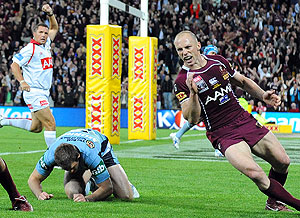Roar Guru

For six years, New South Wales has struggled and failed to find four players to match Slater, Lockyer, Thurston and Smith. Until they do, New South Wales will not win another State of Origin series.
Unless they do so soon, it may be too late.
Just as Kevin Rudd now knows the risks of hyperbole, “the great moral challenge of our generation”, billing State of Origin games as “the most important ever” will wear thin very quickly.
There have been thirty series of the State of Origin competition. Queensland has won 16, New South Wales have triumphed in 12 and two have been drawn.
Queensland has won 50% more series than New South Wales.
New South Wales has had two periods of three-year dominance and two periods of two-year dominance.
Queensland has had one period of six-year dominance, two periods of three-year dominance and two periods of two-year dominance.
In other words, of the 30 seasons, in only four series have the winners changed from the previous year.
I began to think why one team has been able to dominate for so long, despite selecting players from the same clubs and national league as their opponents.
This dominance is the symptom. The issues behind this are that the pond is too shallow when it comes to the key players, 1, 6, 7 and 9.
Further, the pond doesn’t renew frequently enough.
Queensland has shown that one state can dominate the series by dominating these positions.
I do not want to denigrate Queensland’s performance. It was awesome, particularly in the first quarter. The Blues simply had no answer.
The third match was not really a contest after the first 25 minutes that saw the score blowout to 24-0 by the 33rd minute. The final scoreline of 34-24 flattered the Blues.
It is not the first game of sport that has been dominated from the first whistle.
The Queensland performance was similar to former Australian cricket teams of the Mark Taylor and Steve Waugh eras or the Australian women’s netball teams of the Ellis era or the Wallabies of the Eales era.
The difference is that these teams were competing with other teams that had a much larger player group to select from and so the balance between the teams was constantly being challenged.
This is not the case in State of Origin Rugby League.
Of the 16 NRL clubs, at the most, only 64 players, those in the critical positions, can influence a game such as SOO.
Of these 64 players, take out those that do not qualify (e.g. Benji Marshall, Issac Luke), those who have retired (Ben Hornby) and those that are not sufficiently skilled and/or experienced (K Foran, Tim Smith, Wallace, Dugan, Barba) or out of form (Carney or Farah) or injured, only a small group is left from which to select the spines of two teams.
There are other reasons, all well-stated and obvious, for the current dominance.
Queensland take it more seriously because it means more to them. They have more great players than the Blues. Be patient because it is cyclical.
The solutions are not that obvious because the format is so specific, state against state.
New Zealanders could help but they may not get the underlying emotion. Brad Thorn would argue differently, but he too is a very different person to the average rugby league player or supporter.
Slater, Thurston and Smith are still at the peak of their powers and Cronk is waiting on the bench. Minnichello, Soward, Pearce and Ennis are nowhere near the level their opponents. The New South Wales bench is empty, too.